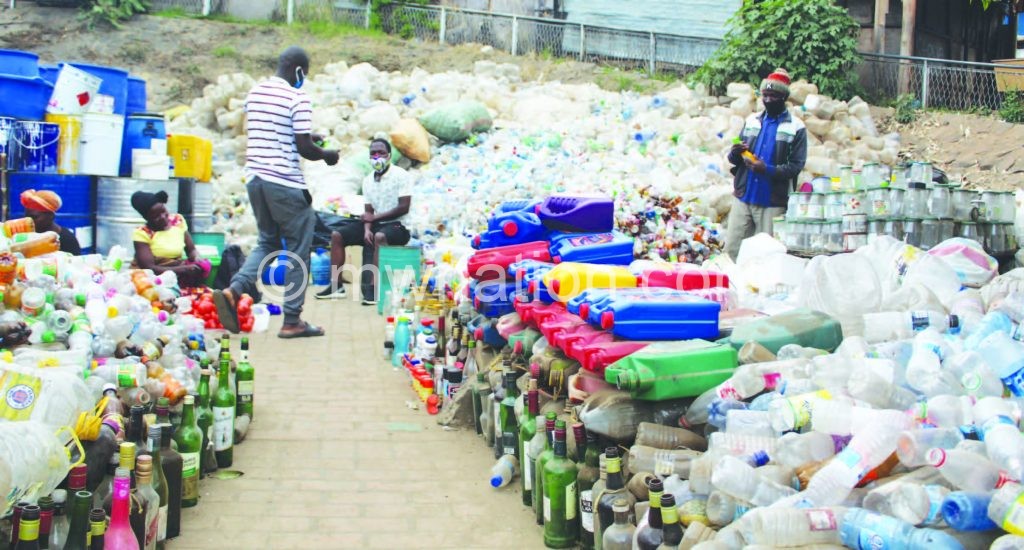Money in empty bottles
Our Staff Writer JAMES CHAVULA catches up with cashing in on empty bottles while reducing and reusing the familiar waste no one recycles.
Malawi’s population has grown by about five million within a decade, exerting more pressure on land, air and water increasingly polluted by poor waste management.

Some sellers of bottles in Blantyre are bothered by piling plastics in open grounds and streams.
“Each plastic bottle discarded in the open is money going to waste. Someone could have made money while making Malawi a little cleaner by selling it to us,” says Moses Phiri, from Chilomoni Township in Blantyre.
Every day around 6am, the father-of-two leaves his populous township for Blantyre Main Market to buy and sell plastic and glass bottles for reuse—a business he inherited from his deceased father in 2005.
“I had to grow quick. Being the firstborn, I had to fend for my siblings,” he states.
But the hot sale that sustains his family is slowly reducing the amount and speed of plastics going into the environment where it takes centuries to rot.
His workplace in the busy marketplace is a molehill of plastics of all sizes that once contained drinks, cooking oil, water and other liquids.
The heap exposes traders’ growing appetite for plastics that remain after the cravings the contents are supposed to quench.
Buzzing spot
Every day, children and adults sell empty water and beverages bottles at K5 each. By close of business at 5.30pm, Phiri would have sold 300 bottles that contained water mostly preferred by conference participants and drinks mostly loved by people on the move.
The growing pile could have clogged the environment had they not landed in the marketplace.
“K5 may be small change for the well-off who use the contents of these bottles, but it keeps my family going. We don’t starve or struggle for basic needs. Every day, we buy about 500 Frozzy bottles and 300 water bottles, but we sell almost half of what we purchase,” he explains.
Each bottle sells at double the buying price, though sales slow down during the chilly and rainy months when the stack builds up fast.
But as summer kicks in, Phiri and his team cannot wait for sellers of cold water, drinks and thobwa “to clear the heap”.
“Our major clients reuse the bottles to repackage drinks to keep their customers cool during the hot months. They come in quick succession to help us stay in business while keeping the city clean,” Phiri says.
The smelly Mudi River in the vicinity is clogged with plastics, a glimpse of the environmental crisis the government wanted ended when it banned thin plastics in 2015. According to deputy director of environmental affairs Michael Makonombera, the ban marks the start of a complete ban on all plastics.
However, there appears to be no immediate solution or waste management for thicker plastics, including bottles seen in streams and open grounds.
“Some bottles seen here would have made the city dirty or blocked rivers. When you bring them to us, you make some money and help solve the problem created by people who do not take responsibility for things they throw away every day,” says Lucius Sili, 23, from Sigerege slum in the shadow of Sanjika Palace, the President’s residence in Blantyre.
Sili fears that the rising struggle against plastic waste may hurt his trade, but says not all will be lost if Malawians learn to sort waste and sell used plastics to his kind.
The lamentations of a growing resistance to plastics melts into envy when he talks about expatriates who bring them bagfuls of used bottles free of charge.
Sili explains: “These people are refusing plastics, but they don’t throw waste anyhow. Waste management begins from home where they put plastic and glass bottles in separate bins from animal and plant material which rots fast. They then bring the bottles while the rest goes to the dumpsite.”
He urges against indiscriminate dumping of waste, saying: “Since you cannot do without plastics, sort your leftovers and sell the plastics to us.
“It’s not waste, but money in your hands. Don’t throw money into the bush. If you call us, we will come and pick it.”
Sili and his colleagues sell the bottles to sellers of drinks, paints, paraffin, spices and other substances.
“The major takers are sellers of drinks, especially thobwa and rebottled water. That’s why we run out of bottles during summer,” he says.
Save our hands
Their most reliable sources are Blantyre City Council waste collectors who pick bottles from piling garbage to supplements their pay.
Jackson Malupi, 39, says: “A complete ban on plastics is chopping our hands or switching off our livelihoods like light bulbs.
“We have no academic qualifications, no skills and no alternative business activity. We make just enough to survive and acquire small assets.”
The father-of-four ventured into this business in 2003 when the vendors were getting plastic bottles from the city and surrounding districts of Chikwawa, Mulanje, Thyolo, Ntcheu and Mozambique. Now, every market has its off-takers.





